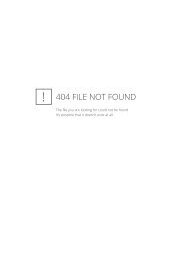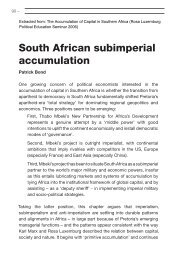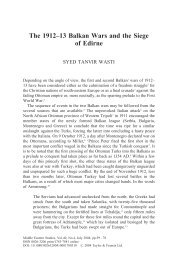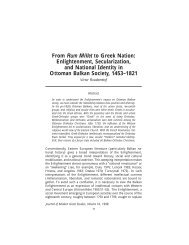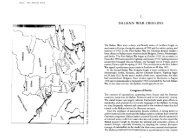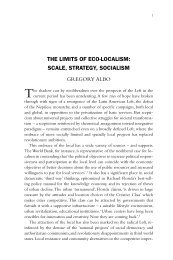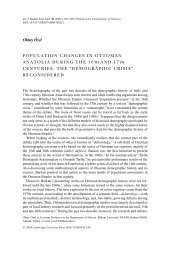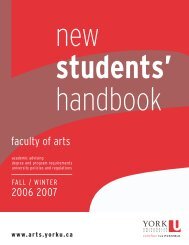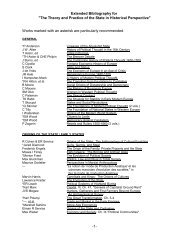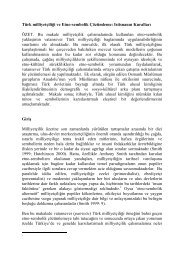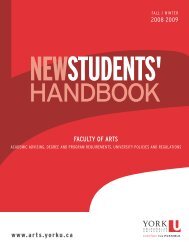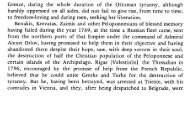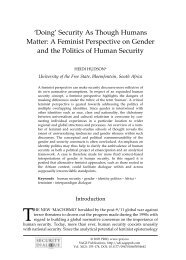FYCSG 05/06 REV2 - Faculty of Arts - York University
FYCSG 05/06 REV2 - Faculty of Arts - York University
FYCSG 05/06 REV2 - Faculty of Arts - York University
You also want an ePaper? Increase the reach of your titles
YUMPU automatically turns print PDFs into web optimized ePapers that Google loves.
Specifically, economic problems arise out <strong>of</strong> the conflict between apparently limitless<br />
human demand for goods and services and a limited supply <strong>of</strong> resources for satisfying<br />
those demands. Courses in Economics expose students both to the wide range <strong>of</strong> individual<br />
and social problems that arise from this conflict and to the distinctive economic approach<br />
to their solution. Economic theory provides students with the analytical framework necessary<br />
for understanding and solving economic problems. Empirical work provides a basis<br />
for improving existing theories and for distinguishing between competing theories.<br />
Admission to all 2000, 3000 and 4000-level courses in Economics is conditional upon<br />
satisfactory completion <strong>of</strong> the Introduction to Microeconomics and the Introduction to<br />
Macroeconomics courses, AS/ECON1000 3.0 and AS/ECON1010 3.0.<br />
AS/ECON1000 3.0 Introduction to Microeconomics. An introduction to the principles<br />
and methods <strong>of</strong> economics, with emphasis on microeconomic theory. Topics will<br />
include the theory <strong>of</strong> markets, price determination, and the theory <strong>of</strong> the firm.<br />
Note: Successful completion <strong>of</strong> this course, together with AS/ECON1010 3.0, is required<br />
for all students who intend to pursue additional courses in economics at the 2000, 3000<br />
and 4000-level, and in order to pursue degree studies in Economics.<br />
AS/ECON1010 3.0 Introduction to Macroeconomics. An introduction to the principles<br />
and methods <strong>of</strong> economics with emphasis on macroeconomic theory. Topics will<br />
include the theory <strong>of</strong> money and banking, the theory <strong>of</strong> international trade and<br />
finance, and the economic analysis <strong>of</strong> such selected topics as unemployment, inflation,<br />
and government budget policy.<br />
Note: Successful completion <strong>of</strong> this course, together with AS/ECON1000 3.0, is required<br />
for all students who intend to pursue additional courses in economics at the 2000, 3000<br />
and 4000-level, and in order to pursue degree studies in Economics.<br />
AS/ECON1530 3.0 Introductory Mathematics for Economists I. This course will introduce<br />
and develop topics in differential calculus, integral calculus, and their applications<br />
in economics. This course is required for all Economics Majors and Minors; it will also<br />
satisfy the Mathematics requirement for the Schulich School <strong>of</strong> Business. (Cross-listed<br />
to AS/MATH1530 3.0.)<br />
Prerequisite: AS/SC/MATH1515 3.0 or OAC Calculus or equivalent.<br />
Corequisite or Prerequisite: AS/ECON1000 3.0 or AS/ECON1010 3.0.<br />
Degree credit exclusions: AS/SC/MATH1000 3.0, AS/SC/AK/MATH1300 3.0,<br />
AS/AK/MATH1550 6.0, AS/SC/MATH1013 3.0, AS/SC/MATH15<strong>05</strong> 6.0, or equivalent.<br />
AS/ECON1540 3.0 Introductory Mathematics for Economists II. This course will introduce<br />
and develop topics including matrix algebra, optimization, comparative statics <strong>of</strong><br />
general function models and their applications in economics. This course is required for<br />
all Economics majors and minors; it will also satisfy the Mathematics requirements for<br />
the Schulich School <strong>of</strong> Business. (Cross-listed to AS/MATH1540 3.0.)<br />
Prerequisite: One <strong>of</strong> AS/ECON1530 3.0, AS/MATH1530 3.0, or AS/SC/AK/MATH1300 3.0.<br />
Prerequisite or Corequisite: AS/ECON1000 3.0 or AS/ECON1010 3.0.<br />
Degree credit exclusions: AS/SC/MATH15<strong>05</strong> 6.0, AS/MATH1540 3.0,<br />
AS/AK/MATH1550 6.0. May not be taken by any student who has taken or are taking<br />
AS/SC/AK/MATH1021 3.0 or AS/SC/MATH1025 3.0 or AS/SC/MATH2021 3.0 or<br />
AS/SC/AK/MATH2221 3.0 or equivalent.<br />
AS/ECON1900 3.0 Introduction to Economics for Non-Majors. An introduction to both<br />
microeconomic and macroeconomic concepts, applied to public policy issues. Intended<br />
for students in other disciplines, this course provides concise economic fundamentals<br />
without the mathematical details <strong>of</strong> AS/ECON1000 3.0 and AS/ECON1010 3.0.<br />
This course serves as prerequisite for some 3000-level Economics courses.<br />
Degree credit exclusions: AS/ECON1000 3.0 and AS/ECON1010 3.0, or equivalent.<br />
Note: This course will not count for Economics major/minor credit or for Business and<br />
Society major credit.<br />
SUGGESTED COURSE SELECTION FOR FIRST YEAR.<br />
(ASSUMES A COURSE LOAD OF 30 CREDITS):<br />
• 1000-level 9 credit Foundations HUMA or SOSC course;<br />
• AS/ECON1000 3.0 and AS/ECON1010 3.0;<br />
• AS/ECON1530 3.0 (Fall term) and AS/ECON1540 3.0 (Winter term); (see Note 1 below);<br />
• 1000-level 6 credit NATS course;<br />
• 3 credit elective course (optional).<br />
Note 1: The course selection listed above assumes OAC (or equivalent) Calculus successfully<br />
completed with a minimum grade <strong>of</strong> 70%. Students without OAC (or equivalent)<br />
Calculus will usually take AS/MATH1515 3.0 in the Fall term, AS/ECON1530 3.0<br />
in the Winter term and AS/ECON1540 3.0 in the Summer session. Students with no OAC<br />
(or equivalent) Mathematics or only one OAC (or equivalent) Mathematics with a<br />
grade <strong>of</strong> less than 70% usually take AS/MATH1510 6.0 in the Fall/Winter session and<br />
AS/MATH1515 3.0 in the Winter term.<br />
Economics and Business<br />
This is a Specialized Honours BA Program administered by the Department <strong>of</strong> Economics<br />
in the <strong>Faculty</strong> <strong>of</strong> <strong>Arts</strong>. The Program is designed to provide a set <strong>of</strong> related courses which<br />
are pertinent for students seeking careers in industry, commerce, finance or government.<br />
Students are also required to select an Area <strong>of</strong> Concentration (such as Business Mathematics,<br />
Financial Analysis, International Economics, Labour Relations or Public Policy)<br />
which permits them to pursue some particular interest in greater depth.<br />
Students are encouraged to apply to the Program upon completion <strong>of</strong> their first 24 credits<br />
with an overall average <strong>of</strong> no less than 5.0, and completion <strong>of</strong> the prerequisite courses,<br />
AS/ECON1000 3.0 and AS/ECON1010 3.0, and AS/ECON1530 3.0 and AS/ECON1540 3.0<br />
(or an equivalent, such as AS/MATH1550 6.0) with an average <strong>of</strong> 6.0. Students should note<br />
that the number <strong>of</strong> spaces in the Program is limited, and meeting the minimum requirements<br />
for admission may not guarantee entry to the Program.<br />
The application deadline for the Economics and Business Program is the first Monday in<br />
February. The late deadline is August 1st.<br />
SUGGESTED COURSE SELECTION FOR FIRST YEAR.<br />
(ASSUMES A COURSE LOAD OF 30 CREDITS):<br />
• 1000-level 9 credit Foundations HUMA or SOSC course;<br />
• AS/ECON1000 3.0 and AS/ECON1010 3.0;<br />
• AS/ECON1530 3.0 (Fall term) and AS/ECON1540 3.0 (Winter term); (see Note 1 below);<br />
• 1000-level 6 credit NATS course;<br />
• 3 credit elective course (optional).<br />
Note 1: The course selection listed above assumes OAC (or equivalent) Calculus successfully<br />
completed with a minimum grade <strong>of</strong> 70%. Students without OAC (or equivalent)<br />
Calculus will usually take AS/MATH1515 3.0 in the Fall term, AS/ECON1530 3.0<br />
in the Winter term and AS/ECON1540 3.0 in the Summer session. Students with no OAC<br />
(or equivalent) Mathematics or only one OAC (or equivalent) Mathematics with a<br />
grade <strong>of</strong> less than 70% usually take AS/MATH1510 6.0 in the Fall/Winter session and<br />
AS/MATH1515 3.0 in the Winter term.<br />
English<br />
The English Department <strong>of</strong>fers a variety <strong>of</strong> courses in the literature <strong>of</strong> the English language.<br />
There are courses in historical periods from medieval to contemporary, in the literature<br />
<strong>of</strong> several nations (Canadian, Post-Colonial, English, and American), in literary theory,<br />
and in various literary genres including poetry, fiction, drama, and criticism.<br />
Students majoring in English are encouraged to recognize that the courses <strong>of</strong>fered at the<br />
2000-level divide in their approach to the study <strong>of</strong> literature and do so in ways that<br />
follow through upon the division <strong>of</strong> the discipline represented by the courses at the<br />
1000-level described below.<br />
All students majoring in English must take 6 credits in a 1000-level English course among<br />
their first 60 university credits. Students majoring in English are advised to take at least<br />
12 credits in 2000-level English courses among their 30th to 60th credits. Students may<br />
only count 6 credits from a 1000-level English course towards their major or minor<br />
program. Students may complete a maximum <strong>of</strong> 6 credits from the 2200 series <strong>of</strong><br />
AS/EN courses for major or minor credit in English.<br />
1. 1000-LEVEL COURSES<br />
AS/EN1100 6.0 Major Authors in English Literature. A historical introduction to English<br />
literature, concentrating on major authors. The objective is not merely to impart information,<br />
but to give practice in useful ways <strong>of</strong> reading texts, thinking about them, and<br />
writing about them. One hour <strong>of</strong> each tutorial group is taught on-line in a laboratory.<br />
8



